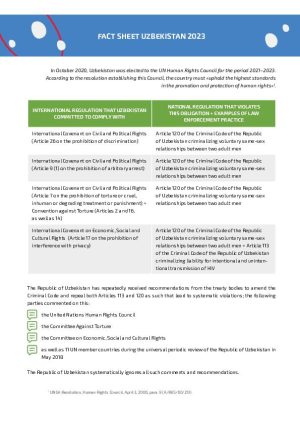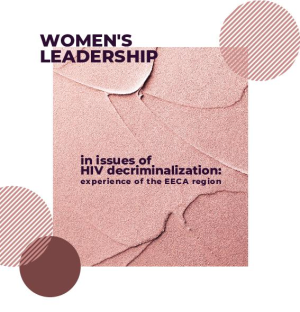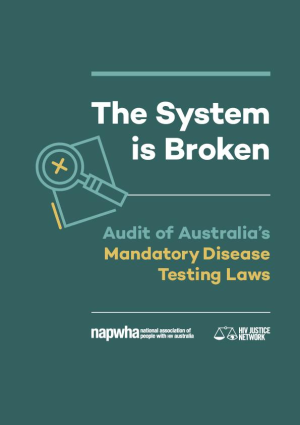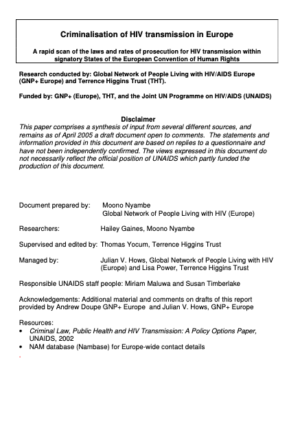Factsheet Uzbekistan 2022
The Republic of Uzbekistan has repeatedly received recommendations from the treaty bodies to amend the Criminal Code and repeal both Articles 113 and 120 as such that lead to systematic violations. The Republic of Uzbekistan systematically ignores all such comments and recommendations, despite having committed to comply with international regulations.
This factsheet summarises violations from international regulations and recommendations from the treaty bodies.
The Criminalisation of HIV in Angola – Discussion document
This brief has been prepared for Civil Society Organisations (CSOs) working on HIV and human rights in Angola, to contribute to discussions around criminalisation of HIV in the country. It sets out concerns regarding the criminalisation of HIV transmission, exposure and non-disclosure in general, based on compelling scientific developments and the position of international human rights and public health experts. It further examines the relevant laws and their application in Angola, provides alternatives to criminalisation and concludes with specific recommendations regarding the reform of such laws in the country.
This brief is also available in Portuguese.
- Alternative links
- Portuguese
Women’s Leadership in issues of decriminalization: Experience of the EECA region
The compendium brings together research from the women's community, examples of documented personal stories and court cases. All the collected materials demonstrate how criminalisation of HIV is a global problem and how it is linked to gender-based violence. Experts believe that criminalising laws do not protect against HIV infection, but only make women worse off in society.
- Alternative links
- Женское лидерство в вопросах декриминализации ВИЧ: опыт региона ВЕЦА
The System Is Broken – Audit of Australia’s Mandatory Testing Laws
Audit, led by Sally Cameron, HIV Justice Network’s Senior Policy Analyst, on behalf of HJN and the National Association of People with HIV Australia (NAPWHA) revealing that mandatory testing laws are at odds with national HIV testing policy and are operating outside the structured and highly successful HIV responses managed by clinicians and departments of health. The audit found that in many instances, the laws, their implementation, and monitoring include numerous structural failures, usually occurring in multiple states.
GNP+ and THT. Criminalisation of HIV transmission in Europe: A rapid scan (2005)
This paper, prepared by Moono Nyambe at GNP+, and managed by Julian Hows (GNP+) and Lisa Power (Terrence Higgins Trust) comprised a synthesis of input from several different sources, pubished in April 2005 as a draft document open to comments. The statements and information provided in this document are based on replies to a questionnaire and have not been independently confirmed. The views expressed in this document do not necessarily reflect the official position of UNAIDS which partly funded its production.
Respondents from 41 out of 45 countries provided information for the study. Of the respondents from the 41 countries that were able to provide information, it was reported that in at least 36 countries the actual or potential transmission of HIV can constitute a criminal offence. This supported anecdotal evidence that increasingly the law is seen as a tool for regulating conduct that can lead to HIV transmission. In 21 of these countries, it was reported that at least one person has been prosecuted.
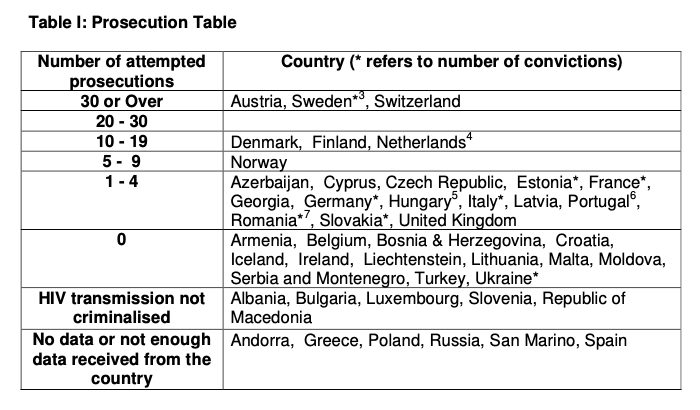
Criminal laws on sex work and HIV transmission: Mapping the laws, considering the consequences
Presents a public health law mapping of U.S. states that mandate HIV testing and criminalize HIV positive sex workers. Shows HIV transmission and exposure laws interact with sex work laws to compound criminal penalties for people charged with prostitution related crimes. Argues that decriminalization of sex work and HIV transmission and exposure is integral to effectively address the HIV epidemic.

